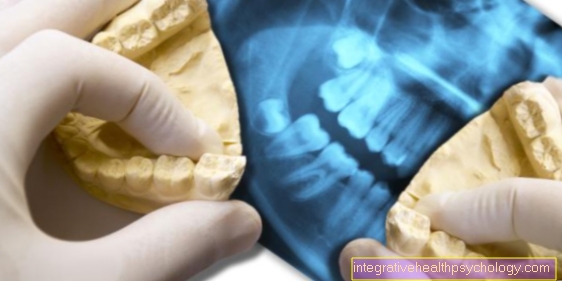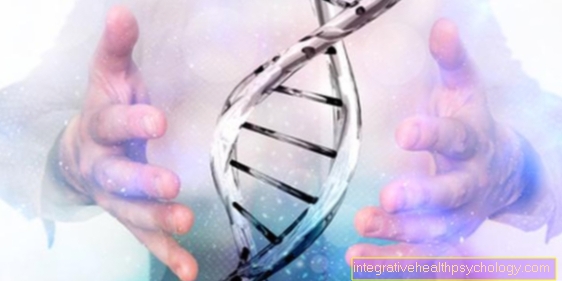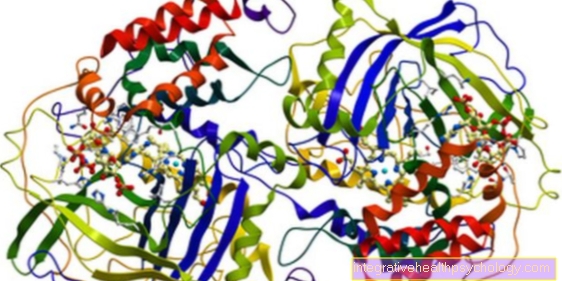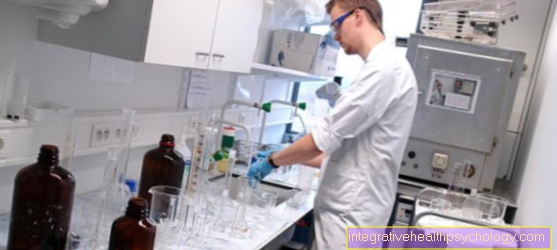Herniated disc with nerve damage
introduction
In the case of a herniated disc, compression of the nerve root in the spinal canal is not uncommon. Either the disc itself or the jelly-like contents of the disc press against the spinal cord. Here the nerve tissue is very sensitive and easy to damage, which can lead to pain, sensory disorders and possibly paralysis.

Symptoms
If the nerve root is irritated or if there is pressure on the nerve over a longer period of time, it is damaged and leads to problems.
The symptoms of nerve entrapment vary depending on the height of the herniated disc. If the damage occurs at the level of the cervical or upper thoracic spine, the patient will notice this through impairment of function or pain in the upper extremities.
If there is an incident in the lumbar spine, symptoms will affect the legs.
Nerve pain
The most common symptom is pain.
If nerve structures are injured, nerve pain, including neuropathic pain or neuralgia, can result.
The nervous system itself is therefore the source of nerve pain and therefore also a treatment goal.
Nerve pain is often burning, tingling, stabbing and / or suddenly shooting in. The pain can radiate and sometimes affect large areas. Often times, patients cannot pinpoint the pain because it is very diffuse. Some people suffer from allodynia: the person concerned feels extreme pain when touching the affected skin. The nerve pain causes the sick, especially if they persist for a longer period of time, sleep disorders and difficulty concentrating. Anxiety and depression are other possible consequences of long-standing nerve pain.
Please also read our article on this Recognize a herniated disc
Inflammation of a nerve
The inflammation in a herniated disc is caused by a pressure load on the nerves due to the changed position of the disc.
An inflammation of the nerves (neuritis) can cause symptoms of varying degrees. Parasitic sensations such as tingling and pins and needles are typical symptoms of nerve inflammation. At the same time, more severe complaints such as paralysis, nerve pain and complete loss of sensitivity in the supply areas of the inflamed nerve can occur.
Read more on the topic: Bragard test
It is discussed whether the pain in a herniated disc is caused by the inflammation or by direct nerve damage.
In fact, both factors likely play an important role in causing the pain. One indication that the pain is largely caused by the inflammation is that anti-inflammatory drugs often relieve the pain of a herniated disc. These drugs inhibit the development of inflammation and have a positive effect on the symptoms of affected patients. The most common medications used for pain due to inflammation are ibuprofen, diclofenac, and ASA. In the same order, they are most commonly used for herniated discs. In the case of chronic use of these medications, care should be taken to ensure that a medicinal stomach protector (e.g. pantoprazole) is also taken in order to avoid complications in the digestive tract.
Further information is also available at: Nerve inflammation
Appointment with a specialist for a herniated disc?

I would be happy to advise you!
Who am I?
My name is dr. Nicolas Gumpert. I am a specialist in orthopedics and the founder of .
Various television programs and print media report regularly about my work. On HR television you can see me every 6 weeks live on "Hallo Hessen".
But now enough is indicated ;-)
A herniated disc is difficult to treat. On the one hand it is exposed to high mechanical loads, on the other hand it has great mobility.
Therefore, treating a herniated disc requires a lot of experience.
The aim of any treatment is treatment without surgery.
Which therapy achieves the best results in the long term can only be determined after looking at all of the information (Examination, X-ray, ultrasound, MRI, etc.) be assessed.
You can find me in:
- Lumedis - your orthopedic surgeon
Kaiserstrasse 14
60311 Frankfurt am Main
Directly to the online appointment arrangement
Unfortunately, it is currently only possible to make an appointment with private health insurers. I hope for your understanding!
Further information about myself can be found at Dr. Nicolas Gumpert
Determination of the severity of nerve damage
There are two important, common classifications for damage to peripheral nerves: the Seddon classification and the Sunderland classification.
The Seddon classification of nerve injuries comprises three degrees of severity, while the Sunderland classification divides nerve damage into five degrees. The severity of the nerve damage depends on the extent of the damage to the axons, myelin sheaths and connective tissue sheaths (epineurium) that enclose the nerves.
Neurologists determine the severity of a nerve lesion using electromyography, electroneurography and, if necessary, magnetic resonance imaging (MRI). The slightest form of nerve damage is an injury to the medullary sheath, while the axons and epineurium are uninjured. The prognosis is very good and the symptoms subside within days to weeks. This degree of severity corresponds to grade one according to Seddon, the so-called neurapraxia, and grade one according to Sunderland.
The severity of nerve damage in a herniated disc is crucial for the prognosis. It determines the possible regeneration of nerve damage and the chances of healing the complaints.
Are you more interested in this topic? Read more about this under: Disc herniation of L3 / L4
Measurement of the nerve conduction velocity
In the case of a herniated disc, an entrapment of the nerve can lead to a reduction in function. This manifests itself, for example, in the form of muscle weakness or numbness. It is important to measure the function of a nerve in order to be able to decide later whether an operation is necessary or not.
With normal nerve function, despite a herniated disc, the symptoms can be treated conservatively, i.e. with exercise and medication. In the event of a clearly measurable impairment of the nerve function, surgical relief of the nerve may be indicated.
Most nerve function is determined using electromyography. Electrodes are attached to both the nerve and a muscle that the nerve reaches. Then a weak electrical impulse is given to the nerve and the muscle response is registered.
The decisive factor here is the speed at which the nerve can transmit the electrical impulse. If the nerve is damaged, the nerve conduction speed is reduced. It is important to have a reference value available beforehand, as each nerve has an individual nerve conduction speed depending on its thickness and its nature.
The procedure is completely safe and painless. This is because only very weak electrical signals are transmitted to the nerve. The skin tingling or muscle twitching may occur during the examination, but these symptoms will go away on their own after the electromyography is complete. An examination usually takes no longer than 20 minutes.
Please also read our article on this Electronurography - measurement of nerve conduction velocity
How do I know the nerve is dead?
If a nerve is inadequately supplied with blood and nutrients over a long period of time, one speaks of irreversible damage and root death. Only a trained doctor can clearly tell that the nerve is dead.
An acute herniated disc can cause enormous pain. As long as the pain is there „The nerve lives and transmits the pain signals. A sudden disappearance of the pain is an important indicator of a possible root death.
therapy

As long as the patient only suffers from pain and does not show any neurological deficits such as paralysis or sensory disturbances, the therapy of a pinched nerve in a herniated disc consists of a conservative strategy.
This means that at this stage no operation is required and the patient is given physiotherapy (see also: Physiotherapy for herniated discs, exercises for herniated discs) and pain medication is treated. Both methods can reduce the pain, although often not entirely. When it comes to pain relievers, anti-inflammatory drugs are most likely to be used. These include ibuprofen, diclofenac or, in rarer cases, ASA (Aspirin®).
If the pain cannot be controlled with conservative therapy or if neurological deficits also occur, the indication for surgical relief of the pinched nerve is made. The operation can be performed in both an orthopedic and a neurosurgical clinic. During the operation, either the entire intervertebral disc responsible for the incident is removed, or only individual parts. Immediately after the operation, it is difficult to tell whether it was successful, as the pain of the operation can override that of the pinched nerves. An improvement should only occur after one to two weeks.
Please also read: Operation of a herniated disc
As an alternative to an operation, a variety of other pain therapies are available to the patient. Individual examples of this would be a pain pump or electrical stimulation of the spinal cord.
Please also read our article on this Therapy of a herniated disc
Duration of nerve regeneration
Unfortunately, the regeneration of a herniated disc with nerve damage takes a long time. The affected intervertebral discs are poorly supplied with fluid and nutrients due to the pressure load. Back training, weight loss and a balanced diet or surgical decompression of the intervertebral disc can help to counteract the compression of the intervertebral disc and nerves. The prognosis also depends on the extent of the nerve damage.
Complete lesions regenerate more poorly than incomplete nerve injuries. In the case of incomplete nerve damage, the damage can be regenerated within a few weeks with appropriate treatment. In the case of more severe injuries, regeneration can take several months and in the case of complete injuries to the nerve sheaths, regeneration may even fail to occur.
Nerves freeze up or become deserted
Freezing nerves, called nerve cryotherapy, is a relatively new method of treating pain. It is mainly used for back pain, such as those that occur with a herniated disc or facet syndrome. Cryotherapy works for a long time and is usually reversible.
Icing can be done on an outpatient or inpatient basis. It is important that the patient is adequately informed about the possible complications before the procedure. The most common complications include infections and frostbite in the area around the puncture, as well as permanent paralysis of the frozen nerve. Before the procedure, make sure that blood-thinning medication is discontinued in good time and that blood clotting has been checked by a doctor. If there is insufficient coagulation, major bleeding may occur in the spinal canal during the procedure.
The procedure itself is either carried out openly, i.e. as part of an operation with general anesthesia, or minimally invasive with local anesthesia. The minimally invasive variant is preferable to the open one. Once the local anesthetic is in place, a small incision will be made and a probe will be inserted into the affected nerve. The inside of the probe can be strongly cooled using nitrogen or carbon dioxide.
Once the probe has reached its destination, it is cooled down to around -60 degrees Celsius. As a result of this icing, the nerve is numbed and can no longer send pain signals. Care must be taken that the probe does not stay on the nerve for too long and that the nerve is not cooled down too much. Otherwise it can lead to unwanted frostbite on neighboring structures or the nerve can be irreversibly damaged. Immediately after the cryotherapy, the result should be checked regularly in order to prevent any complications at an early stage.
The role of vitamin B in neurological symptoms
The vitamin B group comprises eight vitamins that act as precursors for important coenzymes in the body. The B vitamins are found in foods of animal origin, such as fish, dairy products or liver, as well as in plant-based foods such as broccoli or spinach. Vitamin B12 is mainly found in animal products and, unlike the other vitamins, can be stored in the body. Vitamin B1 is important for the transmission of stimuli in the nervous system and vitamin B12 also fulfills essential tasks for the functioning of the nervous system.
A deficiency in B vitamins can cause nervous system disorders. At the same time, an adequate supply of vitamins can have a positive effect on nerve function.





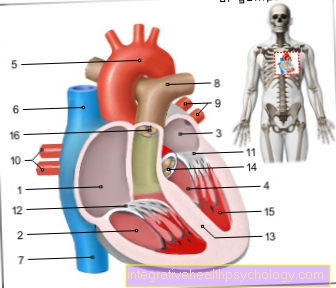



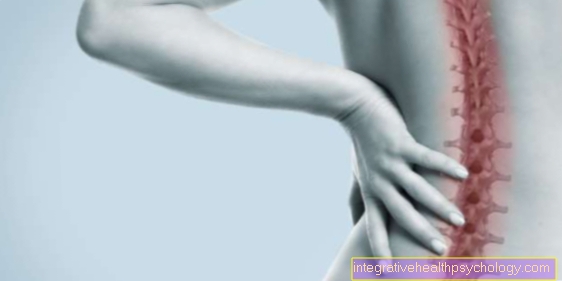

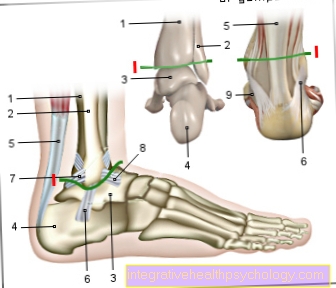


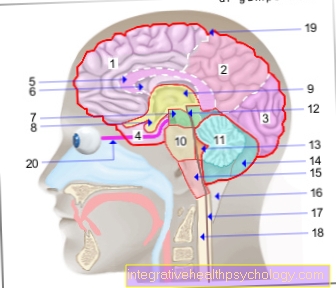

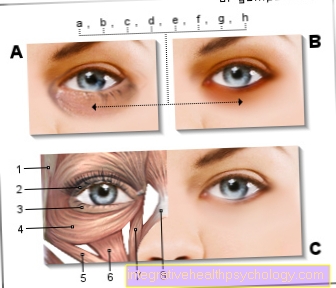

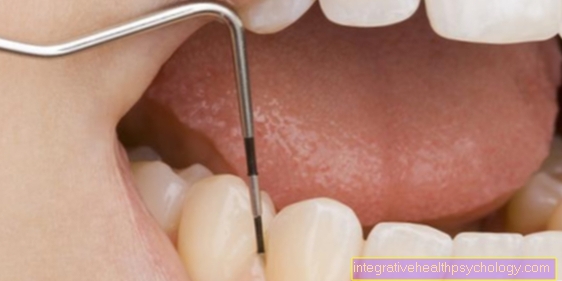

.jpg)
